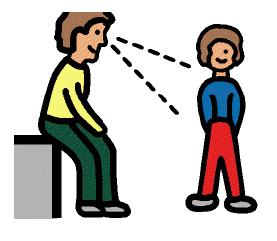Pain in the Assessment
By Colleen Tomko
What is the real purpose of doing an assessment?
Is it to compare how a person is to the norm?
If so, where will that lead to?
What can be done with information identifying a person’s weaknesses?
Can you build goals on what a person cannot do?
What is this doing for my child?

These are the questions I began to ask myself as my husband and I sat in a three-hour session with twelve professionals telling us what our child can not do. We live with him, love him, and have known him from birth, but somehow they were going to tell us what he can not do? Ironically, we had never asked them what he couldn’t do, how far behind he is, or how he compares to other children.
Numerous professionals have told us, literally hundreds of times, what our son’s deficits and differences are. He has grown up repeatedly hearing this. And to think, some of these very people who analyze his deficits suggest placing him in a segregated environment to “protect” him from being teased.
The result of all these assessments and analyses has been a negative impact on our family and child’s well-being. Hearing the very people working with your child describe him negatively and not as a whole person with abilities and needs is extremely distressful. As I sat and listened, they described some other child, for it certainly wasn’t mine. They described a child who “chooses” to not do the things my son’s disability limits him from doing. What I was hearing was “how he wasn’t performing,” rather than “how they were meeting his needs.”
 For us, it does not accomplish anything to dwell on the already well-documented limitations arising from our child’s disability. We are quite aware of his disability and pretty sure that it isn’t going to suddenly go away. The continual critiquing of what others feel are your child’s faults causes you to become defensive. Most people would not want to have themselves or their children described by what they can not do, let alone with a professional seal.
For us, it does not accomplish anything to dwell on the already well-documented limitations arising from our child’s disability. We are quite aware of his disability and pretty sure that it isn’t going to suddenly go away. The continual critiquing of what others feel are your child’s faults causes you to become defensive. Most people would not want to have themselves or their children described by what they can not do, let alone with a professional seal.
Instead, assessing how well the environment and others are meeting our child’s needs would be more useful and meaningful. An assessment like this, focusing on how adequately alternative methods, adaptations, and supports are being provided would more accurately reflect things that can readily be changed. It would provide an avenue to plan for success without continually re-documenting that our child has a disability.
Even though we feel that the professionals mean well and are doing what they feel is best for our child, we wonder how they would react to being evaluated on the same terms. What if instead of looking at what they were accomplishing, they were described in terms of what they were not able to achieve? What if they were viewed as choosing not to do their job when they were not provided with the supports and materials they needed? What if every time they needed assistance, it was described as a way to prevent some negative outcome rather than supporting a positive outcome? What if out of twenty to thirty pages describing them only a few strengths were listed? How would they react to attending a meeting with twelve people telling them these things in this way? Would they feel defensive? Would they get emotional?
 We want others to see our child as a whole person and to treat him as they would want themselves or their children treated. Because he has a disability does not mean he does not have abilities. It does not matter how he compares to others or if his abilities are less than the “norm,” they are still strengths. Looking at what he can do is important and how to build on that to help him achieve his individual potential. What matters most to us is that our son remains on a path in life that leads him to a sense of purpose and meaning, and feeling fulfilled in his life. Focusing on his weaknesses does not lead to that path. Assessments must be based on strengths to be useful in building goals and to accurately describe an individual. Assessments should be purposeful, not painful.
We want others to see our child as a whole person and to treat him as they would want themselves or their children treated. Because he has a disability does not mean he does not have abilities. It does not matter how he compares to others or if his abilities are less than the “norm,” they are still strengths. Looking at what he can do is important and how to build on that to help him achieve his individual potential. What matters most to us is that our son remains on a path in life that leads him to a sense of purpose and meaning, and feeling fulfilled in his life. Focusing on his weaknesses does not lead to that path. Assessments must be based on strengths to be useful in building goals and to accurately describe an individual. Assessments should be purposeful, not painful.
Material Copyrighted 1996 Kids Together®
May be copied for non-profit use only. Please notify us of your intentions.
Can be linked but not copied onto other websites.
